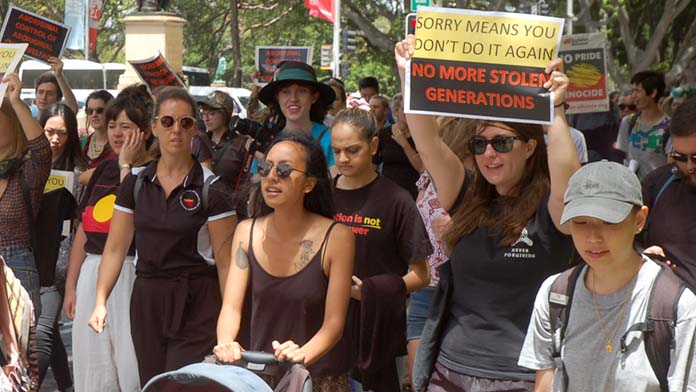Dealing with the cost of living is Anthony Albanese’s new year’s resolution, he says, with inflation now over 7 per cent.
But his efforts to cap energy prices are too weak to stop power bills going up further. While the government says price rises would have been worse without its actions, bills are still expected to soar another 20 per cent this year. Labor has let the coal and gas companies off far too easily.
Labor has also opened the year by releasing details of its climate safeguards mechanism to address emissions from industry. It, too, delivers for big companies at the cost of the climate, allowing them unlimited use of dodgy offsets instead of actually reducing emissions.
This is designed to allow new coal and gas mines to open under the pretence that their emissions can be offset.
Albanese is also campaigning for an Indigenous Voice to parliament, with plans for a referendum later this year.
Labor had hoped that Liberal leader Peter Dutton would back the idea. Instead Dutton is doing his best to drum up opposition. He is demanding Labor answers questions about how Voice members would be selected and how it would operate.
It is already clear enough what the Voice would look like—a powerless advisory body that could be ignored the minute it raised any real demands for change.
But Dutton’s attack is potent because Labor wants to avoid discussing the details of the proposal. The more they do so the more obvious it is that the whole process will change next to nothing for Indigenous people.
There have been a succession of Indigenous advisory bodies established over the past 50 years. Each was abolished in turn when it began to get too critical of government.
Labor’s Minister for Indigenous Australians Linda Burney has claimed that, “Enshrining a voice in the Constitution will make sure it’s protected and cannot be abolished at the whim of government.”
But Labor says the Constitution won’t contain any of the details about how the Voice might be put together or funded. That means any future government could dissolve it and change its membership or withhold funding.
Linda Burney says that the Voice is “about improving the lives of First Nations people by making our voices heard”.
But the idea that governments don’t know what Indigenous people want due to lack of consultation is simply a nonsense. Indigenous people have been calling for decades for self-determination and Aboriginal control of Aboriginal affairs, land rights and real funding to help end the poverty, over-incarceration and deaths in custody that are a result of colonisation.
Distraction
The referendum process is a massive distraction from doing anything serious about the poverty and racist injustice Indigenous people face.
It allows Labor to look like it is doing something for Indigenous people without tackling any of the real issues.
Despite claims the Voice has been requested by Indigenous people, there is significant Indigenous disinterest and opposition to it.
The rallies on Invasion Day this year in Melbourne, Brisbane and Sydney are calling for “treaty before Voice”, with many of the organisers against the idea of the Voice altogether.
Many Indigenous activists see treaty negotiations as a way to deliver substantial change through compensation and land rights. But there is no way Albanese is going to offer any such process.
Real land rights would be a serious challenge to capitalism and the mining companies. Under current native title laws Indigenous people have no right to stop mining companies destroying their lands. Gas company Santos has been able to over-ride Gomeroi opposition to coal seam gas mining in the Narrabri/Pilliga area in NSW.
Justice would also require self-determination and a level of funding for services like education, jobs and housing that no government has ever been willing to provide.
The biggest changes for Indigenous people came as a result of the wave of struggle in the 1970s. This resulted in the first moves towards self-determination, Aboriginal control and land rights legislation.
Winning real justice will require a return to the kind of mass struggles and union support that powered that movement.
Today unions in NSW have offered support to the Gomeroi people’s struggle against Santos. Albanese and NSW Labor leader Chris Minns are both backing the project.
School Strike for Climate’s call for another Climate Strike in Sydney on 3 March is a chance to rally opposition to the project and build pressure on Labor to halt the more than 100 new coal and gas projects in the pipeline.
Labor’s efforts over the cost of living, climate, and Indigenous rights show that real change is not going to come through parliament. We need to build the kind of protests and union fightback that can win it.






